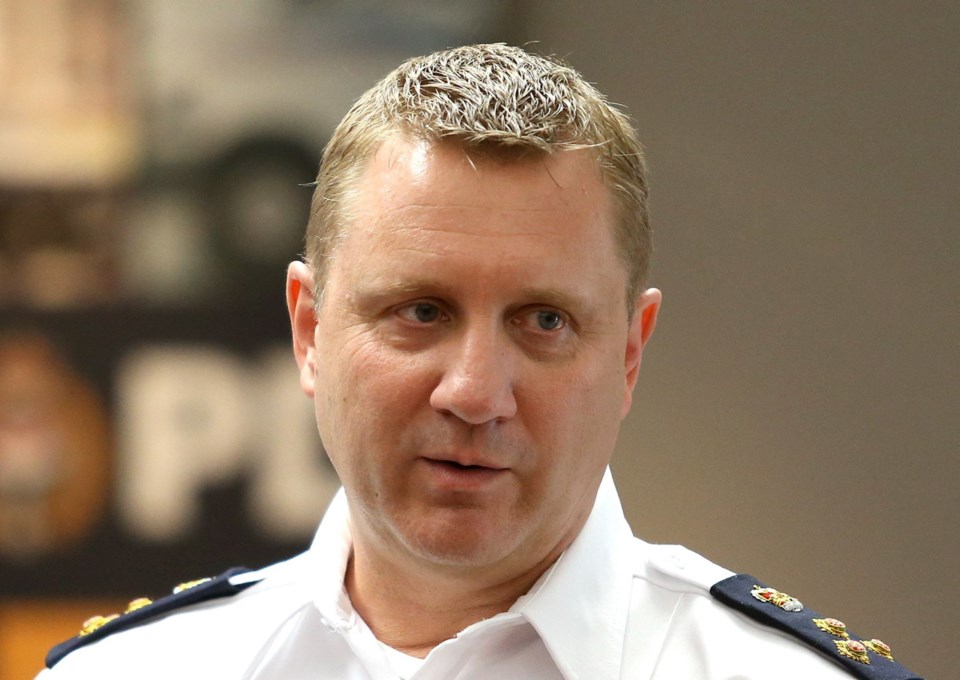Despite progress in de-escalation training, many police officers continue to carry stigma and stereotypes about people with mental illness, which could lead to violent altercations, according to a report released Wednesday by the Mental Health Commission of Canada.
“Many still subscribe to the notion that mental illness equates to violence and thus, personal risk to the police officer,” said the report, co-authored by former police chief Terry Coleman and forensic psychologist Dorothy Cotton.
The report, presented at the final day of the Canadian Association of Chiefs of Police conference taking place in Victoria, made 16 recommendations for improving and standardizing training for dealing with people with mental illness.
Coleman said front-line police officers need to be better aware of the signs that someone is in mental distress and adapt their approach — for example, calmly negotiating with an individual instead of yelling orders.
“Negative interactions with police are difficult to reverse when it comes to lasting perceptions of police,” the report said. “Many indicated that a police officer’s initial response is a major factor that influences whether an interaction will escalate into aggression and violence.”
The report, which looks solely at police training, recommended further collaboration between front-line police officers and mental-health workers who may be able to accompany the officer to the call or provide advice on the best way to deal with a person in crisis.
In Greater Victoria, the Integrated Mobile Crisis Response Team, which consists of social workers, nurses, child and youth workers and two police officers, responds to mental-health emergencies.
The Victoria Integrated Community Outreach Team, which focuses on clients struggling with drug addiction, also partners health-care professionals with a police officer and a parole officer.
The report also recommended directly involving people with mental illness in the development of police training courses. Some officers don’t see mental-health calls as “real police work,” an attitude that needs to change, Coleman said.
B.C. was lauded for the mandatory crisis intervention and de-escalation training required for police first-responders and supervisors. The program was mandated after the Tasering death of Polish immigrant Robert Dziekanski in 2007. Police recruits have received the training since 2012, and officers are required to take a refresher course every three years.
There should be regular assessments of police officers’ mental health training the same way police officers take firearms courses regularly, Coleman said.
The report noted that the Victoria Police Department grades officers on their ability to de-escalate situations, show empathy, demonstrate active listening, provide necessary report and resolve the situation by including hospital or community referrals.
Victoria Police Chief Frank Elsner said the report is important in outlining a national strategy on policing and mental health.
“This report was very specific to policing and some of the things we can do better and how we can help improve the situation. However, I don’t want to lose sight of the fact that there are more partners in this,” he said, adding that the health care system has a major role as well.
That was echoed by Public Safety Minister Steven Blaney, who said it’s the responsibility of the provinces to provide intervention for people who are mentally ill before they encounter the criminal justice system.
“As important as police training in matters of mental health is, police are not doctors and should never be expected to act as such,” Blaney said.
Mental Health Act cases have spiked across the country over the past few years. Victoria police have seen a 356 per cent increase in “disturbed person” calls, up from 226 calls in 2008 to 1,031 calls in 2013. The biggest spike was between 2009 and 2010, when such calls more than doubled to 674 calls from 314.
Coleman said the increase in calls is also posing a challenge in more remote communities where both police and mental-health resources are stretched thin.
Chief Supt. Ray Bernoties, who heads the Island district RCMP, said detachments commanders from northern communities on Vancouver Island recently met with Island Health officials to develop further strategies for co-operation.
“In our more remote communities, officers draw on their experience and training alongside other community resources (community nurses, physicians, family, friends) to bring individuals to the attention of health care providers in the nearest larger centre, or identify mobile resources that they can access in their home community,” Bernoties said.
Mental illness and policing
Key statistics released in the TEMPO: Police Interactions report:
• People with mental illness are more likely to be arrested and more likely to be subject to use of force.
• 2 in 5 people with mental illness have been arrested in their lifetime
• 3 in 10 people with mental illness have had the police involved in their care
• 1 in 7 referrals to emergency psychiatric inpatient services involve the police
• 1 in 20 police dispatches or encounters involve people with mental-health issues



